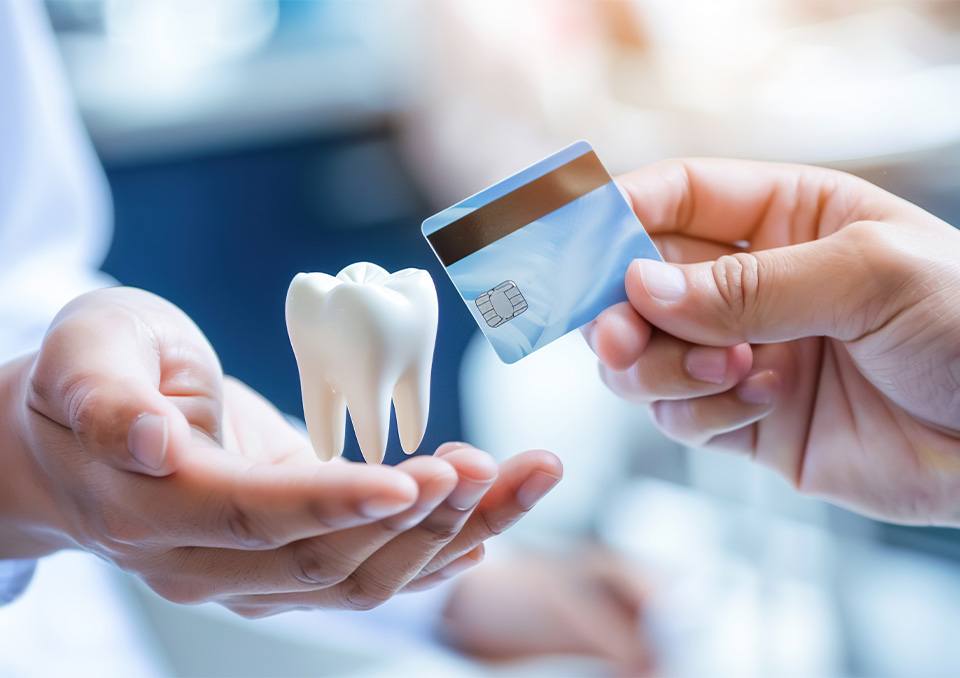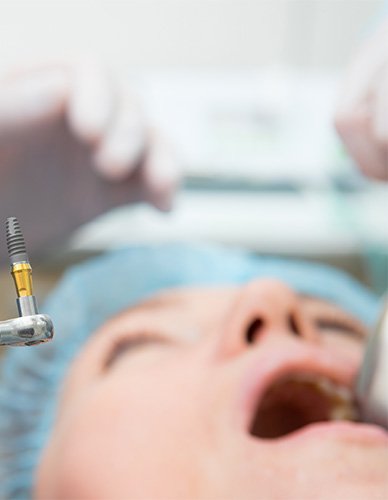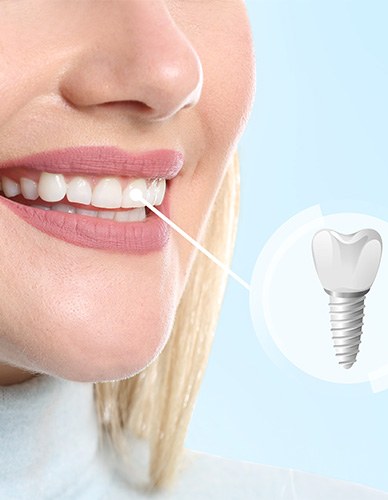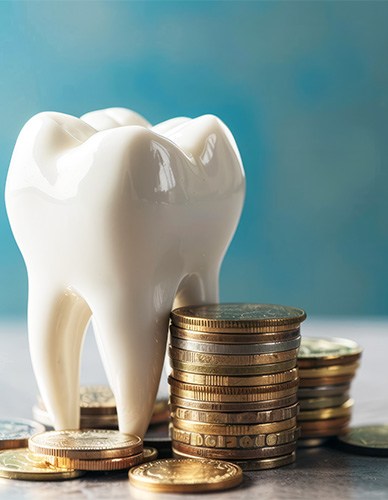Dental Implants — Richardson, TX
The Closest Thing to Natural Teeth
Dental implants replace missing and hopeless teeth permanently. They restore the ability to eat, speak and smile confidently, and offer great advantages to your quality of life! Dental implants interact with the jawbone, replacing both the dental crown and root portions of teeth. Because of this, dental implants provide the closest replica of natural tooth structure of any tooth replacement. If you have missing or hopeless teeth, Dr. Stampe and Dr. Gater can help you determine if tooth replacement with dental implants at our Richardson, TX dental office are the right option for your smile. Our team is experienced at placing dental implant restorations and works closely with trusted specialists to complete your implant procedure. If you’re ready to learn more about rebuilding your smile with the closest thing to natural teeth, read on or give us a call to schedule your next appointment.
Why Choose CityLine Dental Center For Dental Implants?
- #1 Partnered with Local Specialists for Optimal Results
- #2 Permanently Replace Any Number of Missing Teeth
- #3 High-Quality Materials Used for Durable & Lifelike Results
What Are Dental Implants?
The 4-Step Dental Implant Process

Since dental implants are considered the peak of tooth replacement options, it’s unsurprising to know that this treatment has multiple important steps to ensure its success. This will typically involve the initial consultation, the surgery, the osseointegration phase, and the delivery of your restoration once everything is completed. Our team will go over the details of your treatment plan during your first appointment, but here’s a brief look at the dental implant process and what you can expect from each stage.
Initial Dental Implant Consultation

You’ll first have to undergo an initial consultation with Dr. Stampe or Dr. Gater so that they can determine if this treatment is right for you. They will use a CBCT scanner to verify the anatomy of your jawbone so that they know exactly how to place the dental implants as well as if there’s sufficient bone density in the areas of your missing teeth. If there isn’t, you might have to undergo bone grafting to get your jaw in good shape. If you also have any underlying complications like tooth decay or gum disease, then you’ll have to receive preliminary services to bring you back to oral health before we can move forward with your procedure.
Dental Implant Surgery

After our team has addressed any concerns and prepared your mouth for dental implants, we will schedule you for surgery with a local specialist so that they can provide the best results possible. During your appointment, your oral surgeon will administer a local anesthetic to ensure that you’re pain-free throughout the procedure. They might even provide sedation dentistry to further minimize discomfort while helping you relax completely. Once they verify that you’re comfortable, they’ll make a tiny incision in the gums to reach the jawbone where they’ll place the dental implant(s) before suturing the gums closed around them. You’ll then have your family member or trusted friend take you home so that you can rest.
Dental Implant Osseointegration & Abutment

It normally takes about 4-6 months to completely heal from the dental implant surgery. During your recovery, you’ll need to allow osseointegration to occur—the process in which the implants effectively fuse with the jawbone. This is what will provide the stability necessary for your restoration(s). Once this is finished, you’ll return to our office so that we can fit your abutment, which is the small metal connector piece that links your restoration to the implant. Then, you’ll go home to let your gums recover.
Delivery of Dental Implant Restoration(s)

You will return to our office once we receive your permanent restoration(s). Our team will place your new dental crown, bridge, or denture onto your dental implants and double-check that your bite is correct. Once we’ve confirmed that you are satisfied with your results and that everything looks well, you’ll be free to go and enjoy your new pearly whites.
Benefits of Dental Implants

Why do many dentists and patients regard dental implants as the modern gold standard for tooth replacement? Simply put, it’s because they offer many unique advantages that you wouldn’t get from traditional dentures and bridges. Below, we’ve listed some of the most important reasons why dental implants might be the best choice for your smile; our team will be happy to explain these benefits in more detail during your initial consultation.
Day-to-Day Benefits

When you use dental implants to fill the space in your smile, there are several benefits that you’ll notice every day, such as:
- No Diet Restrictions: Patients with traditional dentures often have trouble eating certain foods. But with dental implants, your new teeth will have enough strength and stability to stand up to virtually any meal, allowing you to eat whatever you want.
- Improved Confidence: Your dental implants will be designed with your natural facial Esthetics in mind, making them look extremely natural. This can help you feel more confident about your appearance so that you can show off your new grin without reservation.
- Speaking Easily: Traditional dentures sometimes slip while you’re talking, which can cause you to slur your words. Dental implants will keep your prosthetic teeth in place so that you can speak clearly at all times.
- Easy Oral Hygiene: You won’t have to make any major changes to your oral hygiene routine. Dental implants can be brushed and flossed just like your natural teeth, which makes it easier to take good care of them.
Health Benefits

Because your dental implants act as new tooth roots, they’re able to offer a wide range of unique health advantages:
- Jawbone Preservation: The implants will provide the bone with stimulation from biting and chewing. This will prevent the jaw from deteriorating after tooth loss, allowing you to maintain a more youthful appearance overall.
- Protection for Natural Teeth: When you lose one tooth, it’s not uncommon for the remaining teeth to start to drift into the gap. Dental implants completely fill in the space in your mouth to prevent dental drift from happening.
- Better Nutrition: Since dental implants let you eat anything you want, it’s easier to maintain the nutritious diet you need to keep up a healthy lifestyle.
Long-Term Benefits

By choosing dental implants over traditional tooth replacements, you’ll be able to enjoy many important long-term benefits:
- High Success Rate: Dental implants have a success rate of around 95%, with the vast majority of them remaining in good shape even 20 years after being placed.
- Youthful Appearance: Because dental implants help you maintain a healthy jawbone, they can prevent the facial collapse that often occurs after tooth loss.
- Longevity: A traditional bridge or denture will likely need to be replaced after 7 to 10 years. Dental implants, in contrast, can potentially last for decades; in fact, many patients can keep them for a lifetime!
Who Dental Implants Can Help

Dental implants bring amazing advantages to your oral health, quality of life, and self-confidence. Plus, they are long-lasting, they do not rely on surrounding teeth for support, and they are impervious to decay! Sound like the tooth-replacement solution you’ve been looking for? Then schedule a consultation with Dr. Stampe and Dr. Gater so they can conduct a comprehensive oral exam and determine if dental implants are right for you!
Who Is a Good Candidate for Dental Implants?

Patients who are good candidates for dental implants typically have several things in common, starting with an interest in replacing one, a few, or an entire arch of missing teeth. They also have enough bone density, they don’t smoke, and they are committed to good oral hygiene habits. Ultimately, the best way to find out if this is the best tooth-replacement solution for you is by scheduling a consultation at our Richardson dental office so we can learn all about your dental history, needs, and goals.
Missing One Tooth

Are you missing one tooth? Good news: we can fill the gap with a single dental implant! One of the biggest advantages of this tooth-replacement solution is that it replaces both the root and crown of the tooth, providing you with a gorgeous smile and a strong bite. So, whether you’re missing one of your front teeth or a back molar, don’t hesitate to schedule an appointment with us to see if a dental implant can give you back the smile you’ve been missing.
Missing Multiple Teeth

Dental implants can also help patients who are missing several teeth throughout their mouth. In fact, they can replace several teeth in a row or multiple teeth in a single arch. Their versatility combined with the fact that they are completely customizable makes them a great option for many patients struggling with mild to moderate tooth loss. Plus, they are crafted from only the best materials, ensuring they look and feel just like the real thing too.
Missing All Teeth

What if you don’t have any of your natural teeth left? Are dental implants an option? In many cases, the answer is “yes!” While a traditional denture is secured in place through natural suction or a special adhesive, implant dentures are secured in place with several strategically placed dental implants. Not only does this make them incredibly stable and durable, but it also adds to their lifelike appearance. So, if you are ready to have a healthy, complete, and beautiful smile again, give us a call so we can schedule a consultation!
Understanding the Cost of Dental Implants

Now that you know more about how dental implants work and who can benefit from them, you’re probably wondering how much they cost. However, the rate can vary from person to person because it depends on your unique circumstances. Once you’ve consulted with one of our CityLine Dental Center experts, our team can provide a detailed estimate for your approval before we proceed.
Continue reading below to learn more about the factors that impact your invoice, and feel free to contact us for additional information.
Preliminary Treatments & Dental Implant Surgery

In many cases, additional procedures are required to ensure that your mouth can support dental implants. If we find signs of gum disease, tooth decay, or insufficient jawbone density that can lead to their failure, those must be addressed before moving forward. You’ll be responsible for all dental work that applies. Thankfully, if you have a dental insurance policy, they might offer partial coverage.
The surgery itself also incurs costs which are influenced by different factors. For instance, artificial teeth being placed further back in the jaw might require additional time and resources to access, which can drive up the rate. Also, the type and amount of anesthesia administered can impact the price. We’ve partnered with some of the best local specialists to complete your surgery, who can walk you through more detailed information about anticipated expenditures.
The Parts of Your Dental Implant

These restorations are versatile solutions that can be adapted to meet your unique needs. Keep reading below to learn more about how the different methods used to make them can affect the total amount due:
- The number required. Patients receiving a single dental implant can expect to pay less than ones who need several.
- The type of replacement. Implants can anchor dental crowns, bridges, or dentures which each have different price points.
- The materials used. Typically, these include a titanium rod covered by a durable ceramic prosthetic, but other options, like zirconia, can also be used, though this may increase your invoice.
- The brand. Like any other product, your artificial teeth can be made by different manufacturers that create them differently to cater to specific needs, which can influence their price.
If you have any questions about how your dental implants are made, please feel free to ask!
How Dental Implants Pay for Themselves

Many patients considering different ways to refurbish their grins opt for dental bridges or dentures because they tend to be less pricey. However, dental implants provide unique advantages that can make them more cost-effective in the long run.
For instance, dentures are notorious for slipping out of place and frequently need to be relined or repaired because they don’t fit correctly. They also often need to be replaced after 5 to 10 years, and you’ll be paying for special adhesives, cleaning solutions, and pastes to maintain them in the meantime.
Dental implants are firmly embedded into your jawbone so they can potentially last the remainder of your natural life. Plus, they don’t rely on your gum tissue or surrounding teeth to stay put, making you less likely to experience sore gums. They’re also easier to clean because all that’s required is brushing and flossing twice daily as usual and routine visits to your dentist every six months.
Does My Dental Insurance Cover Dental Implants?

Most dental insurance plans don’t include dental implants, though some exceptions exist. Our team is happy to work with you to review your benefits and fill out paperwork to help you maximize your coverage. Other portions or services, like X-rays or preliminary treatments, might be included that can reduce the total owed.
Making Dental Implants Affordable

Our team understands that not everyone has dental insurance, and we don’t want your budget to keep you from undergoing procedures to improve your oral health. That’s why we’ve partnered with CareCredit. If your application is approved, you can break down your final invoice into more manageable monthly payments that are easier on your wallet.
Maintaining & Caring for Your Dental Implants

Like many other patients, you may have ultimately chosen to restore your smile with dental implants because of their long lifespan. The key to keeping yours in pristine condition, and increasing the chances of them lasting for 30+ years, is proper care and maintenance. With this in mind, keep reading to learn a few habits we recommend incorporating into your routine (as well as some habits we recommend avoiding).
Make Oral Hygiene a Priority

Remember, even though your dental implant cannot decay, you still need to implement good oral hygiene habits into your daily routine. After all, peri-implantitis (a form of gum disease) is one of the leading causes of dental implant failure. So, if you want to prevent that from happening, you need to take good care of your teeth, your gums, and any existing dental work you have!
Eat a Healthy Diet

Dental implants, like your natural teeth, are not indestructible, which is why we encourage our patients to exercise caution with crunchier foods. We also recommend keeping sugary and starchy foods to a minimum since they increase your risk of tooth decay. Simply put, it’s best to opt for nutrient-dense, well-balanced meals as often as possible.
Break Bad Habits

Although biting your nails, chewing on ice cubes, or using your teeth to remove plastic wrapping may not seem like a big deal, these are all habits that can damage your dental implants. So, do your best to break any existing bad habits before that happens! If you need any recommendations, don’t hesitate to let us know! We can share what has proved to be successful over the years.
Protect Your Dental Implants

Breaking bad habits is a great first step. However, it’s not the only one we recommend taking. To prevent chips and cracks in your restoration, we also recommend wearing a mouthguard during sports, including non-contact ones like running. Also, if you grind or clench your teeth at night, get in touch with us so we can have a nightguard made.
Schedule Regular Dental Checkups

The last recommendation we have is often overlooked: visiting our Richardson dental office every six months for a dental checkup and cleaning. This is important, even if you don’t have any of your natural teeth left. After all, we cover a lot of ground during these appointments – from screening for oral cancer to making sure your dental implant is in good condition.
Dental Implant Failure & Salvage

Even though dental implant failure is rare, it is important to be ready to act should the worst-case scenario ever occur. If it seems like your dental implants have come loose or are causing you pain, our team is ready to help. Once we have examined your mouth and figured out what the problem is, we will work with you to put together a salvage plan so that you can restore your oral health and protect your entire smile.
Dental Implant FAQs
How Long do Dental Implants Last?
Dental implants might be the right solution for you if you're looking for a long-lasting restoration. They have been known to last 30+ years, much longer than dental bridges or dentures, although it can depend on how well you maintain them. You should brush and floss twice daily, followed by rinsing with mouthwash. Also, try to avoid biting into any overly hard or sticky foods or inanimate objects (like pen caps or fingernails) to prevent potential damage.
Finally, visiting our team every six months allows us to monitor your dental condition so we can identify and treat any areas of concern, like an injured implant, before they get worse.
Does Getting Dental Implants Hurt?
It’s normal to feel anxious about major surgical procedures, but we want to assure you that we will do everything we can to help you feel comfortable. Before placing your dental implants, we will numb the area with a local anesthetic. This is often sufficient to avoid any potential pain because the jawbone doesn’t have many nerve endings, but in most cases, we will sedate you to help you remain calm and relaxed. Because of this, you might not remember the details of your appointment after the fact.
It’s normal to have some aches and inflammation for a few days, but typically, the worst subsides after the first 24-72 hours. If you’re feeling sore, it’s usually safe to take over-the-counter medications like Tylenol and ibuprofen to alleviate symptoms. You can also apply an ice pack or cold compress for some temporary relief.
If your pain doesn’t fade or lasts longer than a week, let us know so we can ensure that you’re healing as intended.
What Can Cause Dental Implants to Fail?
These prosthetics are incredibly resilient and have a remarkably high success rate of 95%. However, they’re not completely invincible. Although it’s uncommon, some circumstances can result in their failure, such as:
- Peri-implantitis. If bacteria penetrate your gums, you can develop an infection that spreads to your jawbone so it’s unable to support your teeth.
- Failed osseointegration. If you lack sufficient jawbone density, the titanium rod of your implant may be unable to fuse with it enough to provide a firm foundation.
- Using tobacco products. These contain nicotine, which is a vasoconstrictor that impacts your body’s ability to deliver nutrients to your mouth so it can fight disease and heal from surgery.
- Chronic teeth grinding can harm your restoration.
Is There Anything I Shouldn’t Eat with Dental Implants?
For the first couple of weeks following your procedure, you’ll likely be feeling somewhat tender and sensitive. You should avoid foods that are hard to chew, like tough meats or raw fruits and veggies. Also, steer clear of alcoholic, sugary, or acidic beverages that attract harmful bacteria and erode your enamel. Remember not to drink from a straw because the force of the suction can dislodge the blood clots over the implant site that are crucial for its healing.
After several weeks or months, your jawbone produces enough new bone growth around the implant that they permanently fuse together. Once this process is complete, your restoration is so strong that there are very few dietary restrictions. That said, you should still use caution when eating anything too hard or sticky that could loosen, dislodge, or chip your it.
How Long Have Dental Implants Been Around?
You might be surprised to hear this, but there is evidence of dental implants being used all the way back in 600 A.D. Thankfully, technology and dentistry have advanced significantly since then. As a result, the materials, the treatment process, and the longevity are vastly different today.
What Should I Do if My Implant Feels Loose?
If your dental implant feels loose, the area surrounding it feels sensitive, or it hurts to bite down, don’t wait – call our Richardson office right away. From there, we can learn more about your symptoms, take X-rays, conduct a visual exam, and determine the root of the problem. The good news is that dental implants can often be saved. Plus, if that’s not an option, we can partner with local specialists to give you a complete, strong, and healthy smile again.
Am I Too Young to Get Dental Implants?
Dental implants cannot be placed until the jaw is fully developed. Since that typically doesn’t happen until the mid-20s, this tooth-replacement solution isn’t an option for children, teenagers, and young adults. Don’t worry – that doesn’t mean you have to live with a gap in your smile. We can use a custom dental bridge or denture to fill the open space in the meantime.
Will I Have to Take Off Work for Dental Implant Surgery?
We generally recommend taking a day or two off work so you can focus solely on recovering. That said, that’s not always needed. For example, if you schedule the procedure on a Friday afternoon, then you can use the weekend to recover.
Will People Be Able to Tell That I Have Dental Implants?
If you get dental implants in Richardson, you won’t have to worry about unwanted attention being drawn to your smile. There are a few reasons for this, starting with the fact that they are inserted directly into your jawbone, which prevents them from moving out of position when you laugh, talk, or chew. They are also crafted from impressions of your mouth, they are created from lifelike materials, and the size, shape, and shade of each one is made with your face shape and dental needs in mind.
Do Dental Implants Decay?
Since dental implants are artificial, they cannot decay. Of course, it’s still possible for your gums to develop an infection and for your natural teeth to develop a cavity, so you can’t throw your oral hygiene regimen to the side. In fact, if you want to reduce your risk of dental implant failure, you need to incorporate healthy habits into your daily routine, like brushing for two full minutes each morning and flossing your teeth before you go to bed at night.
Can Dental Implants Replace Molars?
Yes, dental implants can replace any of the teeth in your mouth, including molars. So, if you’ve been struggling to smile confidently, chew properly, and enunciate clearly because you’re missing some or all of your back teeth, don’t hesitate to schedule a consultation with us! Then, we can determine if you’re a good candidate for dental implants and, if you are, begin working on your treatment plan.
